Consequences Of Violating Probation In Colorado
Violating Probation – Don’t Violate Your Probation!
In Colorado, probation serves as an alternative to incarceration, allowing individuals convicted of certain offenses to remain in the community under specific conditions set by the court.
Violating probation can lead to significant legal repercussions. The consequences of a probation violation in Colorado depend on various factors, including the nature of the violation, the original offense, and the individual’s compliance history.
If you have been arrested for a crime in Colorado Springs, I can help you. Contact me now for your Free Case Review.
Types of Probation Violations
Violating probation in Colorado is generally categorized into two types:
Technical Violations: These occur when an individual fails to adhere to the specific terms and conditions of their probation without committing a new criminal offense.
Examples of violating probation include:
- Missing scheduled appointments with a probation officer.
- Failing to pay court-ordered fines or restitution.
- Not completing mandated community service.
- Testing positive for prohibited substances.
- Traveling outside the jurisdiction without permission.
Substantive Violations: These involve committing a new criminal offense while on probation. Such violations are considered more severe and can lead to harsher penalties.
Consequences of Violating Probation
When a probation violation is alleged, the probation officer may file a complaint with the court, leading to a probation revocation hearing. During this hearing, the court assesses the evidence to determine whether a violation occurred and decides on the appropriate course of action.
Potential consequences include:
- Continuation of Probation: The court may decide to continue the individual’s probation under the same terms, especially if the violation is minor and the individual has a history of compliance.
- Modification of Probation Terms: The court can modify the conditions of probation to address the violation. Modifications may include:
- Extending the probation period.
- Imposing additional community service hours.
- Requiring participation in counseling or treatment programs.
- Implementing stricter reporting requirements or electronic monitoring.
Revocation of Probation: For serious or repeated violations, the court may revoke probation entirely. This action can result in:
- Incarceration in jail or prison for a duration up to the maximum term for the original offense.
- Resentencing, which may involve harsher penalties than initially imposed.
Factors Influencing the Court’s Decision
Several factors influence the court’s decision regarding the consequences of a probation violation:
- Severity of the Violation: Substantive violations, such as committing a new crime, are treated more severely than technical violations.
- Compliance History: An individual’s prior adherence to probation conditions plays a significant role. A history of compliance may result in more lenient consequences.
- Nature of the Original Offense: Violations related to the nature of the original offense may lead to stricter penalties. For instance, a person on probation for a drug-related offense who tests positive for drugs may face harsher consequences.
- Risk to Public Safety: If the violation poses a threat to public safety, the court is more likely to impose stringent penalties.
Legal Rights During Probation Violation Proceedings
Individuals accused of violating probation in Colorado have specific legal rights, including:
- Right to Notice: The individual must receive written notice detailing the alleged violations.
- Right to a Hearing: A probation revocation hearing must be conducted, during which the individual can present evidence and challenge the allegations.
- Right to Legal Representation: The individual has the right to be represented by an attorney during the proceedings.
- Standard of Proof
In probation violation hearings, the standard of proof is generally “preponderance of the evidence,” meaning the court must be reasonably satisfied that a violation occurred. This standard is lower than the “beyond a reasonable doubt” standard required in criminal trials.
Violating Probation In Colorado
Violating probation in Colorado can lead to serious legal consequences, including modification or revocation of probation and potential incarceration. The court’s response to a probation violation is influenced by the nature of the violation, the individual’s compliance history, and the specifics of the original offense.
Here’s the best advice: If you are on probation, you should adhere strictly to all conditions to avoid these potential probation violation problems. If you do happen to violate your probation, I can help you. Please contact me for your Free Consultation, and let’s discuss how I can help.



 Out of a field of approximately 1,100 attorneys surveyed,
Out of a field of approximately 1,100 attorneys surveyed,